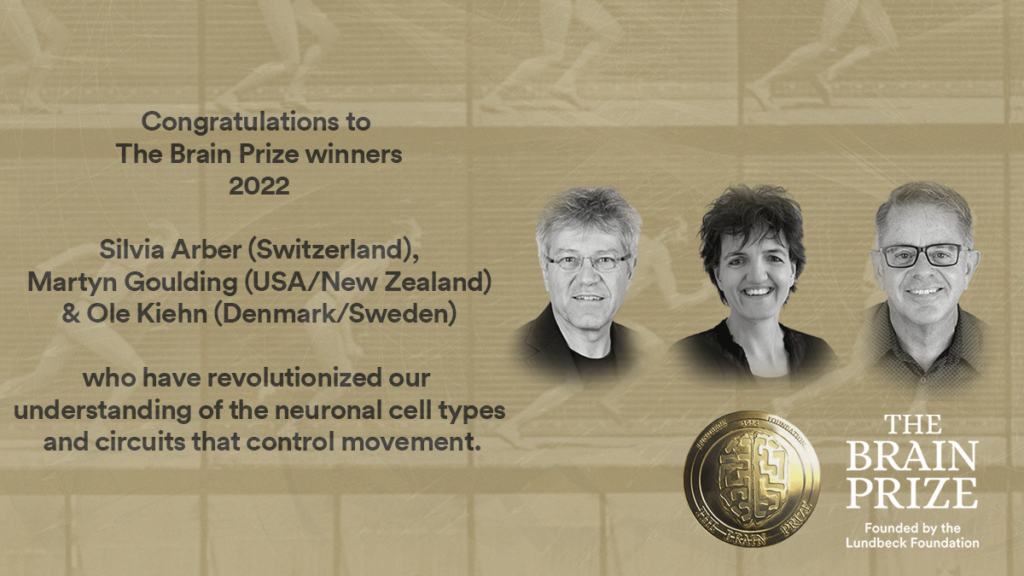
The Brain Prize 2022 awarded to neuroscience pioneers who revolutionised understanding of neuronal cell types and circuits underlying movement
04 March 2022
Neuroscience News
FENS is delighted to announce the 2022 Brain Prize was awarded to an international group of three neuroscientists from Switzerland, Denmark and USA/New Zealand: Silvia Arber (CH), Ole Kiehn (DK) and Martyn Goulding (US/NZ). They have revealed the nervous system’s inner workings by mapping the neuronal cell types and circuits in the brain and spinal cord that control movement.
Their work has revolutionised our understanding of how we move, research now recognised with the award of the 2022 Brain Prize – the world’s most prestigious prize in neuroscience. All our interactions with the world depend on our ability to move. Understanding how the nervous system generates movement is a fundamental goal of neuroscience and is at the heart of devising new strategies for the restoration of movement following injury or disease.
Three internationally renowned professors in neuroscience have transformed our understanding of the specific cell types and circuits that control movement.
For their groundbreaking work, the Lundbeck Foundation will award them the Brain Prize, worth DKK 10 million (approximately $1.5m, EUR 1.3m). Theirs is not only a remarkable discovery story in fundamental neuroscience, but it also highlights the need and paves the way for cell type-specific diagnostics and interventions in disorders of movement such as ALS, Parkinson’s disease, and spinal cord injury.
“The ability to move is fundamental,” says University of Edinburgh Professor Richard Morris, chair of the Brain Prize Selection Committee. “From the first steps of a baby through to the balance and agility required in riding a bicycle, movement is something we do all the time. Understanding how the brain and spinal cord control movement is a huge scientific challenge. Elegant experimental work by the three recipients has helped uncover how intentions to move are transmitted through the intricate firing of brainstem circuits all the way down to the specific pattern-generating cells of the spinal cord whose activity controls the muscles of the body including the fingers, arms and legs.”
About the winners
Silvia Arber
PhD in Neurobiology from University of Basel, at the Friedrich Miescher Institute for Biomedical Research (FMI) in Basel, Switzerland. Today she is Professor of Neurobiology at the Biozentrum of the University of Basel and a Senior Investigator at the FMI in Basel, Switzerland.
Martyn Goulding
Professor and Departmental Head, Molecular Neurobiology Laboratory, The Salk Institute, La Jolla, CA, USA. Adjunct Professor, University of California, San Diego (UCSD), La Jolla, CA, USA.
Ole Kiehn
Graduated in medicine and Doctor of Medical Science from the University of Copenhagen, Denmark. He is currently Professor in Integrative Neuroscience at the Department of Neuroscience, University of Copenhagen and Professor in Neurophysiology at the Department of Neuroscience, Karolinska Institutet, Sweden.
About the Brain Prize
The Brain Prize is the world’s largest neuroscience research prize, and it is awarded each year by the Lundbeck Foundation. The Brain Prize recognises highly original and influential advances in any area of brain research, from basic neuroscience to applied clinical research. Recipients of The Brain Prize may be of any nationality and work in any country in the world. Since it was first awarded in 2011, The Brain Prize has been awarded to 41 scientists from 9 different countries. Brain Prize recipients are presented with their award by His Royal Highness, The Crown Prince of Denmark, at a ceremony in the Danish capital, Copenhagen.
About the Lundbeck Foundation
The Lundbeck Foundation is a foundation that aims to improve people’s health and lives by supporting research at the highest level within biomedicine and the natural sciences. The Lundbeck Foundation awards the world’s largest brain research prize, The Brain Prize, to brain researchers who have had a ground-breaking impact on brain research. In partnership with The Lundbeck Foundation: The Brain Conferences, The Brain Prize Lecture at the FENS Forum [Shouldn’t this be a complete sentence?]
About FENS
Founded in 1998 at the first Forum of European Neuroscience, the Federation of European Neuroscience Societies (FENS) is the main organisation for neuroscience in Europe. FENS currently represents 44 European national and single discipline neuroscience societies with more than 20,000 member scientists from 33 European countries. FENS promotes neuroscience research to policymakers, funding bodies and the general public, both regionally and globally. FENS promotes excellence in neuroscience research and facilitates exchanges and networking between neuroscientists within the European Research Area and beyond.